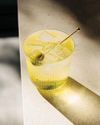
It's hard not to stare at Yoko Arano's socks. The spry 89-year-old is otherwise sharply attired, from her neat trouser suit to the amber beads around her neck. Yet her unusual hosiery, covered in Pollock-like ink splatterings, hints at another story.
Arano is one of Japan's most celebrated calligraphy artists. I'm standing in her Niseko studio, alongside local gallerist Kiyoe Hosokawa, who introduced us only minutes earlier. Beyond the windowpane, snow is falling in thick, cartoonish tufts. But in this cosy, light-flooded space, where signs of Arano's craft abound-artworks drying on walls, folded newspapers, ink splashes across floors-time feels distant.
A heater hisses gently as Arano slips on overalls over her clothes and removes her necklace before laying paper on the floor. After a moment of stillness, her performance begins. With a low groan, she bends her knees, hunches her back, and, with a primal force, lifts a knee-high brush from a bucket, its bushy mass of horsehair weighted with syrupy black ink. Splashed onto the paper, it dances across the whiteness before taking the softly blurred shape of a Japanese kanji character. Seconds later, Arano pauses and, with a final groan, heaves the brush back into the bucket. She stands and surveys her wild abstraction before slipping smoothly back into conversation. "I chose the kanji teinei, which means 'polite"," she says, smiling, "because it's a nice, warm feeling meeting you today."
For a lot of people, Hokkaido means one thing: snow, or whatever you want to call snow-yuki, in Japanese; upas, in the Indigenous Ainu language; or Japow, a hip local contraction of Japan and powder. Though it is the least populated and northernmost of Japan's islands-closer to Russia than to Tokyo-Hokkaido attracts a booming, enthusiastic winter sports crowd, which is drawn by the light, fluffy mixture that blankets its mountains each year.
Diese Geschichte stammt aus der November 2023 - January 2024-Ausgabe von Condé Nast Traveller India.
Starten Sie Ihre 7-tägige kostenlose Testversion von Magzter GOLD, um auf Tausende kuratierte Premium-Storys sowie über 8.000 Zeitschriften und Zeitungen zuzugreifen.
Bereits Abonnent ? Anmelden
Diese Geschichte stammt aus der November 2023 - January 2024-Ausgabe von Condé Nast Traveller India.
Starten Sie Ihre 7-tägige kostenlose Testversion von Magzter GOLD, um auf Tausende kuratierte Premium-Storys sowie über 8.000 Zeitschriften und Zeitungen zuzugreifen.
Bereits Abonnent? Anmelden

Made In Nagaland
From home textiles to jewellery, clothing, and more, here are the 10 Naga craft brands you need to know. By Sohini Dey

TOKYO RIGHT NOW
As impossible to pigeonhole as ever, the Japanese capital is buzzing with fresh influences and new ideas

RAISING RAI: WHERE THE MAGIC HAPPENS
Raghu and Avani Rai on connecting via worlds seen through their lenses.

GILDED WATERS
Paula Hardy boards one of the last remaining dahabiyas on the Nile for a different perspective of Egypt's storied river

THE GIRL WITH GRAND DESIGNS
Gauravi Kumari is part of Jaipur's new creative set that is bringing fresh perspectives to the city's design legacy.

A FACE FOR ADVENTURE
Retooling the iconic Rolex GMT-Master II for fresh explorations.

THE GRAND seduction
Palermo's chaos, swagger, and temperamental charm cast a hypnotic spell.

Rhythm Divine
Wherever you go in Gwalior, the myth and magic of Tansen are inescapable, as Sam Dalrymple finds out.

IDEAL WORLD
Palestinian chef Fadi Kattan explains why he went ahead with the publication of Bethlehem, his celebratory cookbook.

NUJUMA, A RITZ-CARLTON RESERVE SAUDI ARABIA
On alittle-visited Red Sea archipelago, the Middle East’s first Ritz-Carlton Reserve reflects both untapped nature and hyperreal modernity, finds Noo Saro-Wiwa.